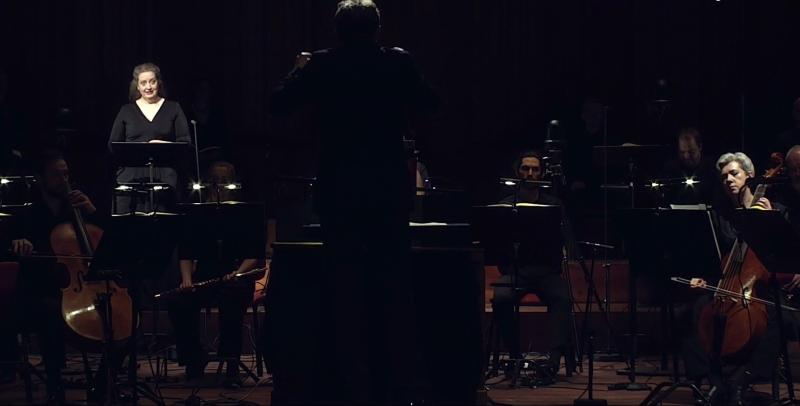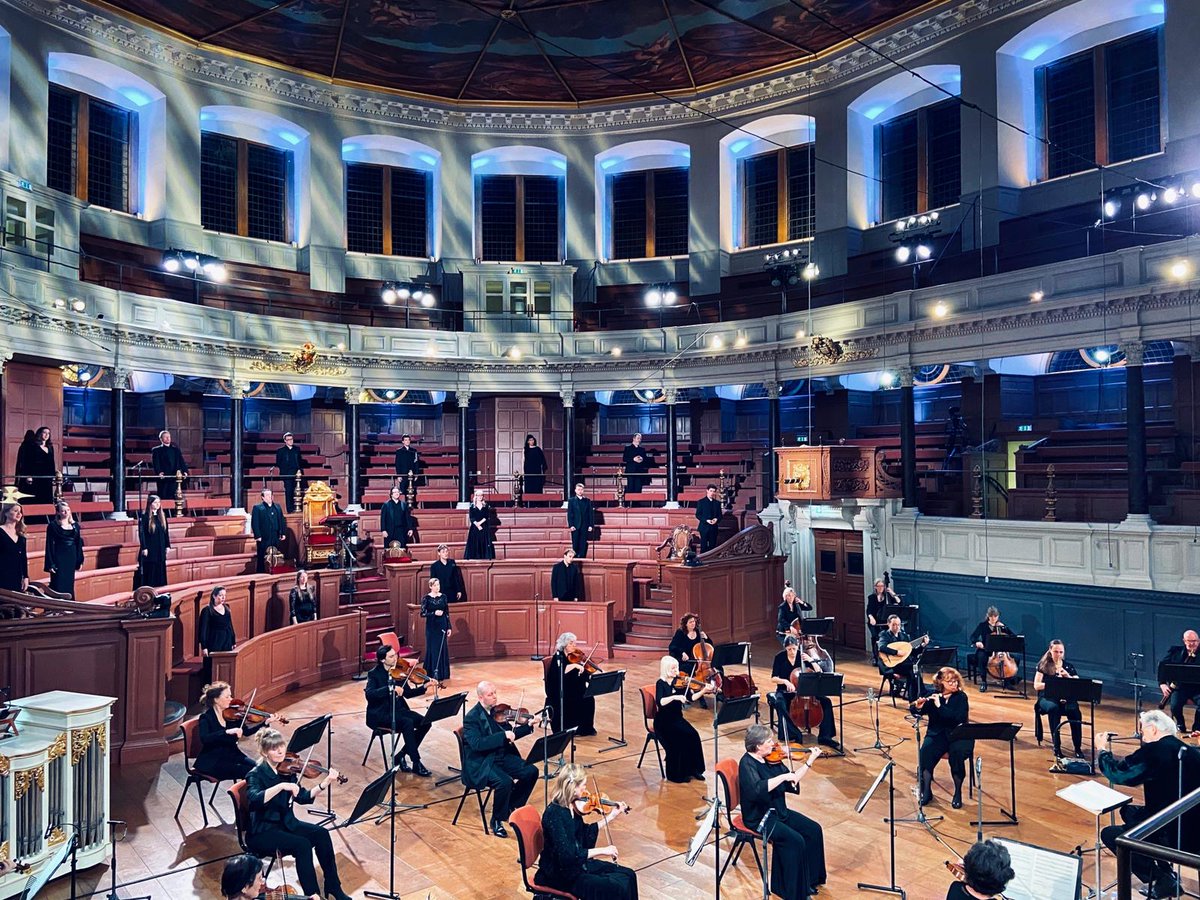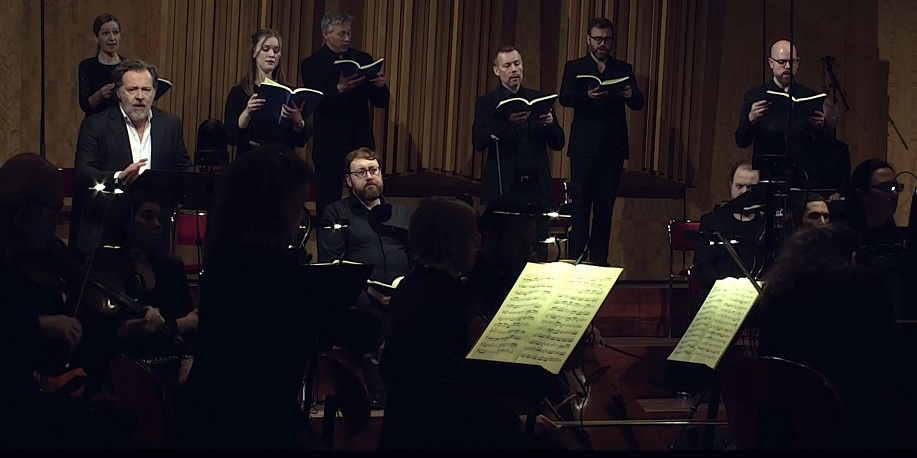Bach St John Passions from Oxford and Stockholm online review – theatrical drive from Gardiner, interiority under Harding | reviews, news & interviews
Bach St John Passions from Oxford and Stockholm online review – theatrical drive from Gardiner, interiority under Harding
Bach St John Passions from Oxford and Stockholm online review – theatrical drive from Gardiner, interiority under Harding
Fine young English Evangelist and Christ versus Gerhaher, Hallenberg and others

Last Easter, viewing options were limited: no-one who saw it will forget a version of Bach’s St John Passion from the church where it was first performed in 1724, Leipzig’s Thomaskirche, with an idiosyncratic tenor taking all the parts other than the chorales – live from a quintet and streamed in from around the world – and accompanied only by organ/harpsichord and percussion.
The greatest knowledge and experience belongs, of course, to Bach’s foremost earthly representative, John Eliot Gardiner, with his Monteverdi Choir and English Baroque Soloists. Though streamed for the first time on Good Friday afternoon, this wasn’t live; we had the benefit of the Sheldonian Theatre’s natural light until No. 21a (some way into the much longer Part Two), and then darkness outside, subdued hues within, all of it skilfully filmed with singers placed at various levels (pictured below). Dramatic drive came partly from all vocalists knowing their parts by heart – no scores – and Gardiner’s familiar thrust, guttiness and dissonance immediately piercing in the first number.  The Monteverdi Choir is surely unsurpassable in bright expressiveness; the dramatic trial of Christ flamed. There was also huge advantage in having a young Evangelist, Nick Pritchard, often feminine in expression but with plenty of energy when needed, very striking when the scene at the cross changes to perception of the Marys – mother, aunt and Magdalena. And a young Christ, true bass William Thomas, made for great pathos.
The Monteverdi Choir is surely unsurpassable in bright expressiveness; the dramatic trial of Christ flamed. There was also huge advantage in having a young Evangelist, Nick Pritchard, often feminine in expression but with plenty of energy when needed, very striking when the scene at the cross changes to perception of the Marys – mother, aunt and Magdalena. And a young Christ, true bass William Thomas, made for great pathos.
Alongside Gardiner’s cut, Daniel Harding’s introspective tenderness and the softer edges of the Swedish Radio Choir took some adjusting to, and you wished that they, too, were score-free; but ultimately they offered a more unified experience (and full marks to Swedish Radio for providing crucial English subtitles; I could find none on the Deutsche Grammophon presentation of the Oxford event). Both conductors, incidentally, know all the words. The Oxford weakness lay in a tenor and baritone of less than rock solid technique in the Part Two arias, which need absolute expressive security: no need to name them, but Andrew Staples moved from softer-grained Evangelist to stylish tenor in Stockholm, and the most dramatic performance of all here came from Christian Gerhaher, carrying over Pilate’s pent-up anger and confusion into “Eilt, ihr angefochtnen Seelen” (“Hurry, you tempted souls”, pictured below with Matthew Rose, seated, an authoritative Christ).  Nor, despite a certain sense of style, are Gardiner’s Julia Doyle and Alexander (son of Michael) Chance a match for Harding’s Julia Kleiter and Ann Hallenberg. With Gardiner, there were rocks in the way of a clear stream; hearing Hallenberg’s “Es ist vollbracht” ("It is accomplished") followed by superlative baritone and soprano arias towards the end allowed tears to flow untrammelled. You felt that here were not just singers, but compassionate human beings who happen to sing.
Nor, despite a certain sense of style, are Gardiner’s Julia Doyle and Alexander (son of Michael) Chance a match for Harding’s Julia Kleiter and Ann Hallenberg. With Gardiner, there were rocks in the way of a clear stream; hearing Hallenberg’s “Es ist vollbracht” ("It is accomplished") followed by superlative baritone and soprano arias towards the end allowed tears to flow untrammelled. You felt that here were not just singers, but compassionate human beings who happen to sing.
It seems uncharitable to end on a quibble, which one had to set aside once noted, but if as Gardiner says in his spoken introduction, Bach offers eternal values beyond the Lutheran context, then we need to see all humanity represented. An all-white line-up, bolstered by Oxbridge choral-scholar conservatism in the English case, isn’t really acceptable. But, that stated, do watch – the Stockholm film is free to view, and in its last half-hour takes us right to the emotional core of Bach’s unparalleled achievement.
- Watch the St John Passion on the Berwaldhallen/Swedish Radio website (free) and on DG (Gardiner performance, £ - until 19 00 hrs on 4 April)
- More classical reviews on theartsdesk
rating
Explore topics
Share this article
Add comment
The future of Arts Journalism
You can stop theartsdesk.com closing!
We urgently need financing to survive. Our fundraising drive has thus far raised £49,000 but we need to reach £100,000 or we will be forced to close. Please contribute here: https://gofund.me/c3f6033d
And if you can forward this information to anyone who might assist, we’d be grateful.

Subscribe to theartsdesk.com
Thank you for continuing to read our work on theartsdesk.com. For unlimited access to every article in its entirety, including our archive of more than 15,000 pieces, we're asking for £5 per month or £40 per year. We feel it's a very good deal, and hope you do too.
To take a subscription now simply click here.
And if you're looking for that extra gift for a friend or family member, why not treat them to a theartsdesk.com gift subscription?
more Classical music
 Robin Holloway: Music's Odyssey review - lessons in composition
Broad and idiosyncratic survey of classical music is insightful but slightly indigestible
Robin Holloway: Music's Odyssey review - lessons in composition
Broad and idiosyncratic survey of classical music is insightful but slightly indigestible
 Classical CDs: Wolf-pelts, clowns and social realism
British ballet scores, 19th century cello works and contemporary piano etudes
Classical CDs: Wolf-pelts, clowns and social realism
British ballet scores, 19th century cello works and contemporary piano etudes
 Bizet in 150th anniversary year: rich and rare French offerings from Palazzetto Bru Zane
Specialists in French romantic music unveil a treasure trove both live and on disc
Bizet in 150th anniversary year: rich and rare French offerings from Palazzetto Bru Zane
Specialists in French romantic music unveil a treasure trove both live and on disc
 Scottish Chamber Orchestra, Ibragimova, Queen’s Hall, Edinburgh review - rarities, novelties and drumrolls
A pity the SCO didn't pick a better showcase for a shining guest artist
Scottish Chamber Orchestra, Ibragimova, Queen’s Hall, Edinburgh review - rarities, novelties and drumrolls
A pity the SCO didn't pick a better showcase for a shining guest artist
 Kilsby, Parkes, Sinfonia of London, Wilson, Barbican review - string things zing and sing in expert hands
British masterpieces for strings plus other-worldly tenor and horn - and a muscular rarity
Kilsby, Parkes, Sinfonia of London, Wilson, Barbican review - string things zing and sing in expert hands
British masterpieces for strings plus other-worldly tenor and horn - and a muscular rarity
 From Historical to Hip-Hop, Classically Black Music Festival, Kings Place review - a cluster of impressive stars for the future
From quasi-Mozartian elegance to the gritty humour of a kitchen inspection
From Historical to Hip-Hop, Classically Black Music Festival, Kings Place review - a cluster of impressive stars for the future
From quasi-Mozartian elegance to the gritty humour of a kitchen inspection
 Shibe, LSO, Adès, Barbican review - gaudy and glorious new music alongside serene Sibelius
Adès’s passion makes persuasive case for the music he loves, both new and old
Shibe, LSO, Adès, Barbican review - gaudy and glorious new music alongside serene Sibelius
Adès’s passion makes persuasive case for the music he loves, both new and old
 Anja Mittermüller, Richard Fu, Wigmore Hall review - a glorious hall debut
The Austrian mezzo shines - at the age of 22
Anja Mittermüller, Richard Fu, Wigmore Hall review - a glorious hall debut
The Austrian mezzo shines - at the age of 22
 First Person: clarinettist Oliver Pashley on the new horizons of The Hermes Experiment's latest album
Compositions by members of this unusual quartet feature for the first time
First Person: clarinettist Oliver Pashley on the new horizons of The Hermes Experiment's latest album
Compositions by members of this unusual quartet feature for the first time
 Gesualdo Passione, Les Arts Florissants, Amala Dior Company, Barbican review - inspired collaboration excavates the music's humanity
At times it was like watching an anarchic religious procession
Gesualdo Passione, Les Arts Florissants, Amala Dior Company, Barbican review - inspired collaboration excavates the music's humanity
At times it was like watching an anarchic religious procession
 Classical CDs: Camels, concrete and cabaret
An influential American composer's 90th birthday box, plus British piano concertos and a father-and-son duo
Classical CDs: Camels, concrete and cabaret
An influential American composer's 90th birthday box, plus British piano concertos and a father-and-son duo
 Cockerham, Manchester Camerata, Sheen, Martin Harris Centre, Manchester review - re-enacting the dawn of modernism
Two UK premieres added to three miniatures from a seminal event of January 1914
Cockerham, Manchester Camerata, Sheen, Martin Harris Centre, Manchester review - re-enacting the dawn of modernism
Two UK premieres added to three miniatures from a seminal event of January 1914

Comments
I could scarcely disagree